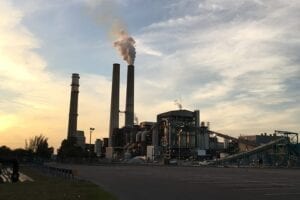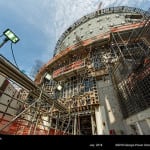The four co-owners of the Plant Vogtle nuclear expansion project in Georgia have voted to continue construction of two new reactors at the site near Waynesboro. The vote on September 26 came two days after the original deadline for a vote on the future of Units 3 and 4, which are scheduled to come online in 2021 and 2022, respectively.
“We are all pleased to have reached an agreement and to move forward with the construction of Vogtle Units 3 & 4 which is critical to Georgia’s energy future,” the co-owners said in a statement Wednesday. “While there have been and will be challenges throughout this process, we remain committed to a constructive relationship with each other and are focused on reducing project risk and fulfilling our commitment to our member-consumers.”
Three of the project’s four owners—Georgia Power, Municipal Electric Authority of Georgia (MEAG Power), and Dalton Utilities—had agreed to move forward with the oft-delayed project earlier this week. The fourth owner, Oglethorpe Power, gave its support, but only with the condition that the owners could agree to cap the project’s costs.
Each of the owners on Wednesday agreed to finalize and execute definitive agreements that will help mitigate each company’s financial exposure. The company’s 8-K announcements will detail their financial obligations for the project. Southern Company and Georgia Power’s filing can be found here, and Oglethorpe’s is here.
The expansion project, which is about half finished, is about five years behind schedule and more than $13 billion above budget, according to cost estimates from the parties involved outlined in filings with government regulators. (For more on the project’s costs, see “How the Vogtle Nuclear Expansion’s Costs Escalated” and “Vogtle’s Soaring Costs.”)
The construction at Vogtle is the largest industrial project in Georgia and has employed more than 7,000 workers. Georgia Gov. Nathan Deal last week in a letter to the co-owners said: “Given the project’s critical economic impact to the State of Georgia, I strongly encourage [the] co-owners to continue work and complete the construction. I am counting on the project co-owners to follow through on the commitments you made to the citizens of Georgia, ratepayers and [to] myself.”
The Plant Vogtle expansion is the only U.S. nuclear power plant project currently under construction. A similar project to add two AP1000 reactors to the V.C. Summer Nuclear Station in South Carolina was abandoned last year. Only one new nuclear unit, Unit 2 at the Watts Bar Nuclear Plant in Tennessee—POWER’s Top Plant for 2018—has come online in the U.S. since Watts Bar Unit 1 entered service in 1996.
Swift Reaction
The Southern Alliance for Clean Energy (SACE), a vocal opponent of the project, was among the first groups to offer reaction to Wednesday’s vote.
“We’re very concerned about today’s announcement because it’s clear the Plant Vogtle nuclear project is in serious trouble if this much arm twisting is necessary to keep all four partners at the table,” said Dr. Stephen A. Smith, SACE’s executive director. “The project details are not fully understood, but Georgia’s ratepayers and energy consumers have every right to know exactly what’s happening with this project before the November elections. With so little transparency, consumers better hold onto their wallets because more costs are coming your way.”
“We are still evaluating this new information, but on first blush it appears that Georgia ratepayers will face more risks with this project going forward than ever before,” said Sara Barczak, regional advocacy director with SACE. “Utility regulators need to fully vet this deal before the November elections as this project appears to be in serious trouble and the Department of Energy should not finalize billions of additional taxpayer-backed federal loan guarantees due to the ongoing fiscal risks of this project.”
Lawsuits Could Impact Project
There are lawsuits in play that could still impact the project. JEA, formerly known as Jacksonville (Florida) Electric Authority, which has a power purchase agreement with MEAG Power to buy electricity from Vogtle, earlier this month sued MEAG Power and filed a petition with federal regulators that outlined how abandoning the project would save JEA’s customers money. JEA has put up billboards in Georgia calling Vogtle a “$30 billion mistake.” It also took out full-page newspaper ads in the region headlined “Plant Vogtle Will Cost You.”
MEAG in turn sued JEA for breach of contract regarding the PPA. JEA is still pursuing multiple ways out of the PPA. JEA, in a statement issued after the MEAG board Monday unanimously voted in favor of continuing the Vogtle project, said: “JEA is disappointed with the decision made by the MEAG Power board of directors to proceed with the Plant Vogtle expansion project. This action effectively ignores an alternative arrangement that JEA presented, which would have provided total savings of $2.5 billion to MEAG Power, Power South and JEA customers.”
JEA in an emailed statement after Wednesday’s vote said, “JEA’s highest priorities are leadership to our community and stewardship of our customers’ interests. To that end, our board of directors and executive leadership have and will continue to act accordingly in the wake of the vote to continue moving forward with the Plant Vogtle expansion project. This decision saddles ratepayers with the burden of funding the project’s more than $30 billion price tag. There is no guarantee that this amount will not continue to increase, so JEA will continue to act in finding a resolution that protects the interest of ratepayers in Georgia, Alabama and northeast Florida first.”
Cost Overruns Prompted Vote
The vote on whether to continue construction at Vogtle was prompted by the latest set of cost overruns in August of more than $1 billion. The vote required 90% of ownership interests to agree to move forward. Georgia Power owns 45.7% of the project; Oglethorpe Power owns 30%. MEAG Power owns 22.7%, and Dalton Utilities owns 1.6%.
Georgia Power in August said its shareholders would partly cover the utility’s portion of the most-recent cost overrun at Vogtle. The project’s other owners are co-operatives, meaning ratepayers would have the burden of paying for increased costs.
The U.S. Department of Energy (DOE) already has paid the project’s owners $5.6 billion of an $8.3 billion loan guarantee for the project. The Trump administration has promised the project an additional $3.7 billion if construction continues.
John Sneed, executive director of the DOE Loan Programs Office, in a letter to the project co-owners on September 21 said his agency acknowledges continuing construction is a “commercial decision” but said the owners must realize Vogtle’s “profound impact on the U.S. nuclear industry.” Sneed in his letter wrote: “The decision each owner makes should be made with an understanding of the ripple effect this project is already having, including job creation and the positive signal of the continued value of commercial nuclear power in our country.” Sneed’s letter said if the project were canceled the DOE “will move to fully enforce its rights under the terms of the Loan Guarantee Agreements to ensure the true guarantors of those funds … are made whole.”
The Odyssey of Plant Vogtle
1970 —The board of directors of Georgia Power, a subsidiary of Southern Company, vote to build a nuclear power plant, designed to include four reactors.
1976 —Construction of the first two reactors begins near Waynesboro, in a rural area of eastern Georgia near the border with South Carolina. The plant is dubbed the Alvin W. Vogtle Electric Generating Plant, or Plant Vogtle. It is named after former Southern Company board chairman Alvin Vogtle.
1987 —The 1,215-MW Unit 1 enters commercial operation.
1989 —Unit 2, also with 1,215 MW of generation capacity, comes online. Cost of the first two reactors, each a Westinghouse pressurized water reactor with a General Electric steam turbine and electric generator, is estimated at $9.2 billion.
2006 —Southern Nuclear, the nuclear power subsidiary of Southern Company, applies for a permit to build two additional reactors at Vogtle. Georgia Power asks the state Public Service Commission (PSC) for permission to bill the utility’s customers for the planning and licensing costs for the two additional reactors.
2009 —The PSC tells Georgia Power it can begin construction on Units 3 and 4 at Vogtle. State lawmakers vote to allow the utility to pass on costs to customers as the project moves along, with the units expected to be completed in 2017. The operating license for the existing Units 1 and 2 at Vogtle is extended another 20 years.
2013 —Construction begins on Units 3 and 4, which would add 2,300 MW of generation capacity at Plant Vogtle.
2015 —Construction contractors sue Georgia Power over continued construction delays that have added an estimated $3 billion to the cost of the project. The completion date is now 2020.
December 2016 —Georgia Power reaches a settlement with state regulators. The utility agrees to controls on the cost of the two new reactors, and agrees to pay penalties if the two units are not completed by year-end 2020.
February 2017 —Toshiba, parent company of Westinghouse—which designed the two AP1000 reactors at Vogtle and served as the project manager at the time—says it has lost $6 billion on its two ongoing U.S. nuclear plant projects: Vogtle in Georgia, and the similar V.C. Summer twin-reactor project in South Carolina.
March 2017 —Westinghouse files for Chapter 11 bankruptcy protection, saying it has lost $9 billion on its two U.S. projects.
May 2017 —Georgia Power reaches a deal to take over the project from Westinghouse. Southern Nuclear, a subsidiary of Southern Company (the parent of Georgia Power), takes over as the project manager.
July 2017 —SCANA Corp. and Santee Cooper say they are ending construction on Units 2 and 3 at the V.C. Summer project. The project is estimated to be 64% complete. The decision comes two days after Toshiba agrees to pay SCANA and Santee Cooper $2.2 billion to exit the project.
August 2017 —Southern Company says there have been more delays in the Vogtle project. It says the cost to build the two new reactors has ballooned to more than $25 billion. Bechtel takes over as lead contractor on the project.
September 2017 —The DOE announces another $3.7 billion in loan guarantees for the Vogtle project. The money is in addition to $8.3 billion already guaranteed by the DOE to support construction.
December 21, 2017 —The PSC supports Georgia Power’s request to continue construction at Vogtle, despite PSC analysts earlier in the month saying the project is “no longer economic.”
August 2018 —Georgia Power announces another $2 billion-plus in cost overruns at Vogtle.
September 2018 —The city of Jacksonville, Florida, and JEA—that city’s municipal utility—ask a Florida court to rule whether a power purchase agreement with Vogtle is valid. JEA says it filed the lawsuit to protect its ratepayers. MEAG Power files a lawsuit against JEA in a Georgia court, accusing JEA of breach of contract.
September 24, 2018 — The project’s co-owners vote on whether to continue construction. Georgia Power and Dalton Utilities earlier had voted to move forward; MEAG Power’s board unanimously votes to continue construction. Oglethorpe Power’s board gives conditional approval, asking for a cap on the project’s costs. The deadline for a final vote is moved to the following day.
September 25, 2018 — Oglethorpe Power continues to ask for a financial agreement concerning costs. The final vote deadline is extended throughout the day, and eventually to 5 p.m. Eastern time on September 26.
September 26, 2018 — The four co-owners reach agreement to move forward with the project.
—Darrell Proctor is a POWER associate editor (@DarrellProctor1, @POWERmagazine).









